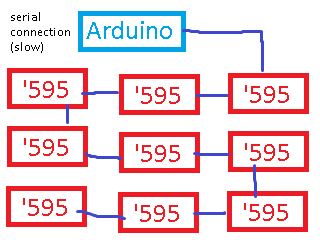Making shift registers faster (connecting them in parallel)
Posted: Mon Nov 12, 2012 7:26 am
In a large LED screen the Arduino cannot shift the data out fast enough to 595 shift registers connected in serial. So, what if they were connected in parallel? It would take more pins, but it should be a lot faster.
The idea:
This should be 3x slower:

This should be 3x faster:

All the latch pins and clock pins would be connected together, the serial branches would be connected as normal, but each branch would have its individual data pins. That way it could run multiple branches but it would only take the amount of time to run as running one branch.
Would this idea work? Is there any foreseeable problems? I am already working on the code.
The idea:
This should be 3x slower:
This should be 3x faster:
All the latch pins and clock pins would be connected together, the serial branches would be connected as normal, but each branch would have its individual data pins. That way it could run multiple branches but it would only take the amount of time to run as running one branch.
Would this idea work? Is there any foreseeable problems? I am already working on the code.